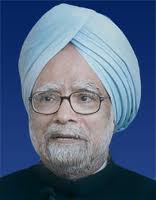
Prime Minister Dr. Manmohan Singh on Friday advocated optimum utilization of available natural resources in order to attain desirable and sustainable economic development.
"This event is relevant in view of the launch of India's Twelfth Five Year Plan, which has faster, more inclusive and sustainable growth as its core objective. I believe India can and should take a leadership role in clarifying the concept of sustainable development," the Prime minister said while addressing the International Workshop on Green Accounting in the capital.
"India's commitment to planned economic development reflects the government's determination to improve the economic conditions of our people and an affirmation of the role of the government in bringing about this outcome through a variety of social, economic, and institutional initiatives," he added.
"But as the economy develops the capacity to grow rapidly, it gives rise to many new challenges. For instance, natural resources are limited, and final. And one needs to decide how to use these scarce resources optimally, both from the economic development and the sustainability perspectives," he said.
He said India intend to achieve growth and alleviation of poverty in a sustainable manner keeping in mind the needs of people, especially the poor.
"Often, economic policies designed to promote growth have been implemented without considering their full environmental consequences, presumably on the assumption that these consequences would either take care of themselves or could be dealt with separately," he said.
"There is evidence to suggest that such policies may actually result in a net decrease in human well-being. Even though it is not easy to quantify this concept. Globally, environmental degradation is manifesting itself through the loss of fertile soils, desertification, decreasing forest cover, reduction of fresh water availability, and an extreme loss of bio-diversity. These are serious consequences, and it has become clear today that economic development must be environmentally sustainable," he added.
Dr Singh quoted from the Brundtland Commission of 1987 that sustainable development meets the needs of the present without any compromise with the ability of future generation to meet their needs, Dr. Singh said that economic growth and development have to be guided by the compulsion of sustainability.
"It requires lot of sustained high quality work to give new meaning and content to the concept of sustainable development. Again, the fact that economic growth and development have to be guided by the compulsion of sustainability is an idea which is now widely accepted," he said.
The Prime Minister also inferred to the ongoing and recent activities by government in order to develop the Indian economy such as national clean energy fund, environmental, agricultural and electricity policies, which focus on sustainable economic development.
"The Government of India has taken several initiatives aimed at greening the Indian economy. A number of national strategies and policies, which inculcate the principle of sustainability, are already in place. For example, we have set up a national clean energy fund by imposing a cess on coal and have also created a compensatory afforestation fund," he said.
"The national environmental policy, 2006 articulates that only such development is sustainable which respects ecological constraints and the imperatives of social justice. the national agricultural policy focuses on sustainable development of agriculture by promoting technically sound and economically viable, environmentally non-degrading, and socially acceptable uses of the country's natural resources. The national electricity policy underscores the use of renewable sources of energy," he added.
-With inputs from ANI
|
|


Comments: